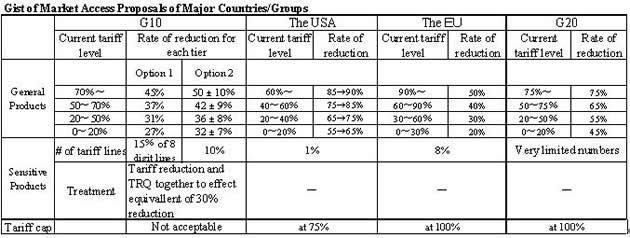|
WTO Agriculture Negotiations: Still a Wide Gap in Proposals
The Trade Negotiations Committee of World Trade Organization (WTO), on October 13, met and summed up the result of a series of talks that started with an informal Council meeting of ministers on 10th October. Talks on agriculture, a focus of the Doha Round of multilateral trade negotiations, saw some progress in that proposals have been presented from almost all the major member countries and groups. However, agricultural talks ended without coming to a convergence of opinions between importing countries such as Japan and exporting countries. Yet, with proposals having been presented from respective countries and groups, the agriculture negotiation is likely accelerated toward achieving agreement on a draft text on modalities by mid-November.
Chairman of the Agriculture Negotiating Group, H.E. Ambassador Crawford Falconer, while giving a positive evaluation to the proposals having been submitted by members and groups with numbers, particularly in the field of market access, sought countries to come closer to each other saying it takes political efforts to achieve actual convergence.
Japan will now face up with the negotiations with the strength of stronger ties among G10 countries "to make all-out efforts to ensure that (Japan's) opinions are reflected in the modalities," said Agriculture Minister Mineichi Iwanaga.
Representatives of G10, the group of ten net food importing countries of which Japan is a part, on October 12, held a joint press meeting and emphasized once again their opposition to putting a ceiling or a cap below which all the tariffs are to be lowered. They urged exporting countries to take a realistic approach to bring the Hong Kong Ministerial Council meeting scheduled in December to a success.
|
* Last minute update: At an informal ministerial meeting of G5 on October 19, Brazil and India, representing G20, tabled additional following proposals relating to developed countries: i) to limit the number of Sensitive Products within 1% of all tariff lines having tariffs imposed on; ii) to apply tariff ceiling of 100% also to Sensitive Products. |

[Top of Page]
|
